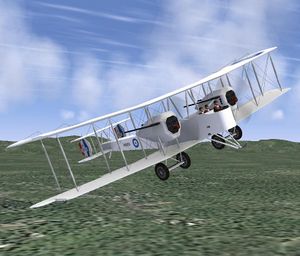Vickers Vimy
Jump to navigation
Jump to search
 | |
| Type | Heavy bomber |
|---|---|
| Author(s) | Emmanuel Baranger |
| FDM | YASim |
| --aircraft= | vimy |
| Status | Alpha |
The Vickers Vimy was a British heavy bomber aircraft of the First World War and post-First World War era. It achieved success as both a military and civil aircraft, setting several notable records in long-distance flights in the interwar period, the most celebrated of which was the first non-stop crossing of the Atlantic Ocean by Alcock and Brown in June 1919.
Specifications
General characteristics
- Length: 43 ft 7 in (13.28 m)
- Wingspan: 68 ft 1 in (20.75 m)
- Height: 15 ft 8 in (4.77 m)
- Wing area: 1,330 ft² (123.56 m²)
- Empty weight: 7,104 lb (3,222 kg)
- Max takeoff weight: 10,884 lb (4,937 kg)
- Powerplant: 2× Rolls-Royce Eagle VIII, 360 hp (268.45 kW) each
Performance
- Maximum speed: 100 mph (161 km/h)
- Range: 900 mi (1,448 km)
- Service ceiling: 7,000 ft (2,134 m)
- Power/mass: 0.07 hp/lb (0.11 kW/kg)
Armament
- 1 × .303 in (7.7 mm) Lewis Gun in Scarff ring in nose and 1 × in Scarff ring in mid-fuselage
- 2,476 lb (1,123 kg) of bombs
Source: Wikipedia